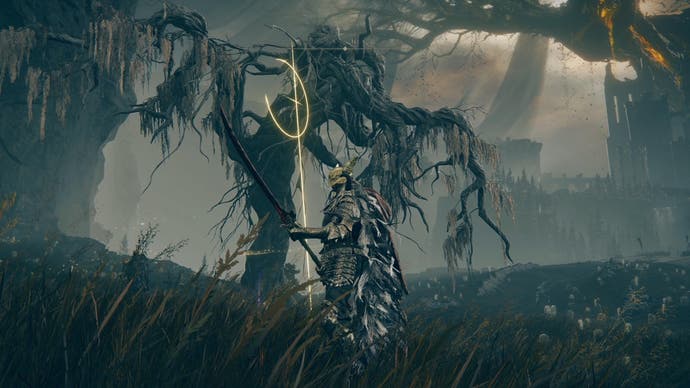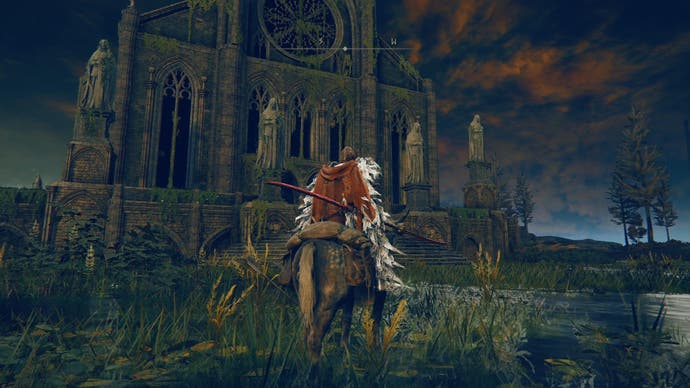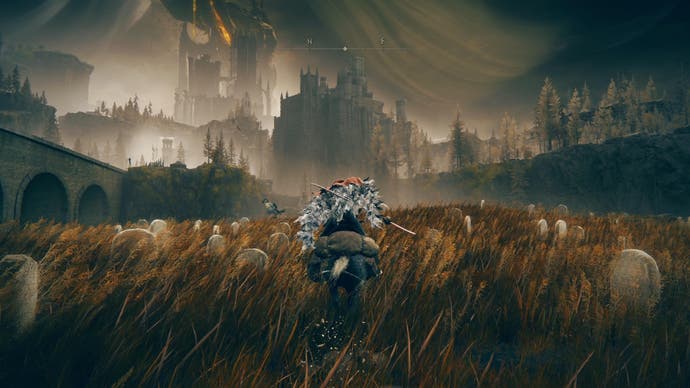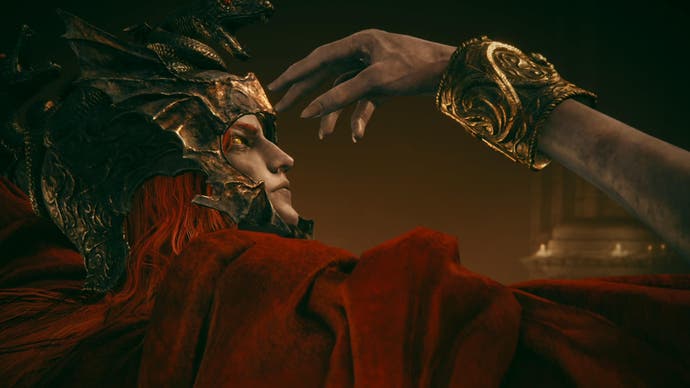I really like Shadow of the Erdtree. I love its varied, spectacular environments. I like how its dungeons are more convincingly integrated into the world design, the map as a whole is a puzzle to solve. I love the visual style, how the exit to each area is framed like a renaissance painting of a post-battle autumnal dreamscape.
But I have to admit, the Elden Ring DLC has a problem with progression. And it’s a problem that an inspiration from Nintendo could solve. After all, the Elden Ring is just Breath of the Wild – Dark Souls, right?
joking. Since its release, much of the Shadow of the Erdtree discourse has focused on difficulty. And that’s to be expected for a Souls game. But really, the perceived challenge is exacerbated by the DLC’s new Shadow Realm Blessing progression system, which limits player agency in favor of a singular mission.
Manage cookie settings
This is somewhat at odds with the Elden Ring experience, the beauty of which is in the options it offers players. Fighting a boss? Go explore elsewhere, find some new gear, or just grind for runes to level up your stats. It’s this integrated approach that, in part, led to the game’s meteoric success.
However, this is lost in Shadow of the Erdtree. At this late game point, leveling stats require hundreds of thousands of runes for minimal improvement. And since any equipment found must be tied to the base game, it rarely offers defensive upgrades over what’s already been purchased. That’s not to say there aren’t options—I’m a big fan of Dryleaf Arts’ kung-fu moves, for example, to cathartically punch dragons in the face—but they aren’t statistically. betterJUST different. Shadow of the Erdtree is a playground for equipment variety, but it’s very easy to get stuck on a boss due to numbers over abilities.
However, FromSoftware’s trouble is that rendering difficulty is a seemingly impossible task. Some players, like me, will have access to the DLC with a recent build of the game, others will have scraped through the necessary bosses or beaten multiple levels of NG+. We are not all on the same level, starting from the same point. How do you satisfy all these players and provide a reasonable amount of challenge?

In this case the studio’s answer is Scadutree Blessings. In short, players find fragments all over the world that can be exchanged for an increase in overall statistics. This scavenger hunt provides a kind of meta-game focus beyond the story, but – unlike the base game – it’s also the only reasonable method of character progression. The progression on offer is also minimal, meaning progression in Shadow of the Erdtree is a slow burn with players largely unable to brute force their way through bosses without fully exploring the world.
Exploration is at the heart of the Elden Ring, and discovery is often a reward in itself. However, leveling up your Scadutree Blessing feels almost entirely necessary (at least for first-time players) to get through the DLC, especially its final boss. Although I personally enjoyed that particular challenge (for a while), it soon became clear that I just wasn’t a high enough Blessing level to stand a chance. And with no in-game help finding fragments, this final challenge feels less like a test of skill and more of an arbitrary scavenger hunt. And it’s not very Elden Ring – but it’s very Zelda.
Take Wind Waker’s finale, for example, which requires collecting the Triforce pieces before entering the final area. Or, in recent open-world Zeldas, your chances of survival are greatly improved by discovering all the shrines. Shadow of the Erdtree Fragments feels similar to me, but it’s a tedious quest – a directionless wander in the vague hope of stumbling upon a precious item.


What I really wanted was the Hero’s Path feature from Breath of the Wild. I wanted to see where I had been and carve a line through the Shadowland, to spot the gaps. The Sheikah Slate’s radar system would also have proved useful, so I could tear into fragments without using guides. Instead, hunting for shards felt like shrine hunting through Hyrule blindfolded. Both Shadow of the Erdtree and Breath of the Wild offer a similar method of character progression through exploration, but disappointingly only one provides you with the necessary exploration tools.
An alternative would be the Metroid treatment. I love how every Metroid game finds a new trick to strip Samus of her abilities. We all know she’ll eventually get the morph ball and a double jump, but it wouldn’t be a Metroid game if we didn’t have to figure these out ourselves. Our tainted could undergo similar treatment in Shadow of the Erdtree. After all, this is an alternate realm accessed via the egg-shaped rebirth version of Miquella – couldn’t we have done the same? Leveling would be faster, found gear would be useful again, and difficulty could be scaled evenly.
It’s not like FromSoftware hasn’t been inspired by Nintendo before. I’ve been playing Dark Souls Remastered recently, and its DLC similarly transports players to an alternate realm where a talking mushroom princess is kidnapped by a dark force – that certainly sounds familiar. The contrasting open fields and claustrophobic dungeons of Elden Ring come from Breath of the Wild, and Shadow of the Erdtree reminds me a bit of Skyward Sword in the way the dungeons flow into the world. Maybe Zelda’s breakable weapons are a step too far for the Elden Ring – or are they? It would certainly prompt players to experiment with their models more often – and not just to get past the final boss.

It’s like the Zelda and Souls games have some kind of ongoing dialogue. Despite its grotesque edge, Souls is clearly rooted in Zelda: from its sword-and-shield combat, to its holistic focus on exploration and discovery. Many other action-adventure games have also followed suit, though none – admittedly – with as much success. Every element of Nintendo’s open-world Zelda games brings players back to that sense of exploration, and Elden Ring does the same. It’s just that in Shadow of the Erdtree, the need to screw up the progression system has skewed the balance, and the lack of discovery tools is the missing link (spam).
That’s partly why it feels like Shadow of the Erdtree might have worked best as a standalone game (though it certainly at least got me excited for whatever FromSoftware produces next). Instead, for all its improvements, it’s typical Souls DLC: a creative, fairy-tale spin on a familiar world filled with even more twisted but sometimes excruciatingly difficult bosses – and as a result one that tries integrate its more linear grinding with the core game structure. At least in the Elden Ring there are calls to help you – after all, it’s dangerous to go it alone.